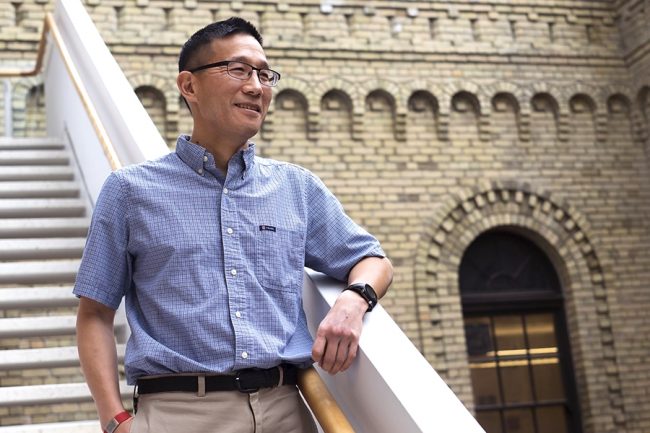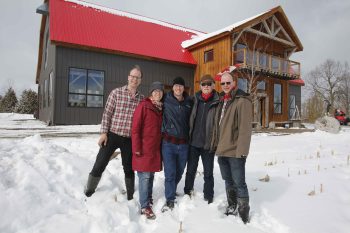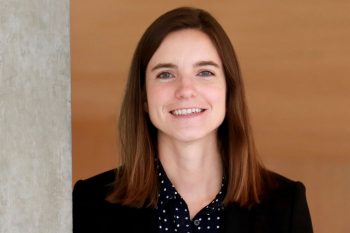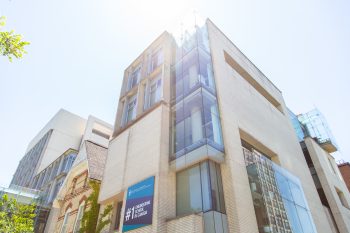Christopher Yip plans to draw on his extensive experience supporting research and academic relationships — both at the University of Toronto and beyond — in his new role as dean of the Faculty of Applied Science & Engineering.
Yip, who currently serves as U of T’s associate vice-president of international partnerships, will serve a five-year term that begins July 1.
“I’m really looking forward to the opportunity to lead the Faculty,” said Yip, who is a professor in both the Department of Chemical Engineering & Applied Chemistry and the Institute of Biomaterials and Biomedical Engineering (IBBME). He also has cross-appointments to The Donnelly Centre and the Department of Biochemistry in the Faculty of Arts & Science.
“U of T Engineering is a tremendous, world-class unit that’s so vibrant, energetic, flexible and adaptive — it’s leading in so many different areas.”
Yip previously served as director of the IBBME, a multidisciplinary institute that connects the Faculties of Engineering, Medicine and Dentistry. There, he oversaw initiatives including the launch of a new biomedical engineering minor for undergraduates, a new biomedical engineering master’s degree, the creation of a new design studio and an expanded teaching lab.
During Yip’s directorship, IBBME was instrumental in launching two major collaborative projects: the Translational Biology and Engineering Program at the Ted Rogers Centre for Heart Research, and Medicine by Design, which undertakes transformative research in regenerative medicine and cell therapy.
“Professor Christopher Yip’s service to U of T, both as director of IBBME and associate vice-president of international partnerships, has been exemplary,” said Cheryl Regehr, the university’s vice-president and provost. “His leadership, vision and dedication to academic collaboration and innovation will be key to the Faculty of Applied Science & Engineering’s future success.”
Yip will succeed Cristina Amon, the Faculty’s longest serving dean in the past half century. Under her visionary leadership, the Faculty has become a global leader in multidisciplinary research, education and innovation.
Amon has enriched experiential, collaborative and active learning opportunities, and evolved the Faculty’s undergraduate and graduate programming to cultivate new generations of makers, innovators and leaders. Under her direction, U of T Engineering created 18 undergraduate minors and certificates, on topics ranging from engineering business and advanced manufacturing to global engineering, robotics and artificial intelligence — a first of its kind in Canada.
During the same period, U of T Engineering more than doubled graduate enrolment, launching new graduate programming from the PhD in Clinical Engineering and the Master’s in City Engineering and Management, to the 10 professional master’s emphases, starting with the ELITE (Entrepreneurship, Leadership, Innovation in Technology and Engineering) to the most recent in Analytics.
Amon envisioned and led the creation of the new Myhal Centre for Engineering Innovation & Entrepreneurship, which elevates engineering experiential education and research through technology-enhanced active learning spaces, prototyping facilities, and design studios where students, faculty and external partners can exchange ideas and launch new ventures. During her tenure, the Faculty strengthened international and industrial partnerships, and established two startup accelerators, The Entrepreneurship Hatchery and Start@UTIAS, which provide a comprehensive suite of programs to both undergraduate and graduate students to nurture the thriving culture of entrepreneurship across U of T Engineering.
The Myhal Centre, a shining beacon of innovation, is also home to a number of new institutes created over the past few years, including the Entrepreneurship Hatchery, the Troost Institute for Leadership Education in Engineering, the Centre for Global Engineering, the Institute for Water Innovation and the Robotics Institute. These multidisciplinary hubs enable the Faculty to leverage its strengths in strategic innovation clusters — including human health, sustainability, robotics and data analytics — to improve quality of life for all of humanity, to develop technologies that drive economic and social prosperity, and to create entirely new industries.
One of the many hallmarks of Cristina Amon’s deanship has been her tireless commitment to increasing diversity and striving to create an inclusive environment so that all members of the Faculty have the opportunity to thrive. Under her transformational leadership, U of T Engineering has almost tripled the number of women faculty members (from 20 to 57), and has been successful at recruiting outstanding undergraduate women, surpassing 40 per cent women in the incoming class over the last three consecutive years.
“This is a tremendously exciting time for our Faculty as Professor Yip takes the helm — my congratulations and warmest wishes for a rewarding journey,” said Amon. “It has been my privilege to work with Chris in his previous roles, and I know his remarkable wisdom and insights will serve our Faculty well in the years to come.”
“Dean Amon has led extraordinary growth and change at U of T Engineering,” said Yip. “Through her inspired efforts and engagement, we now have the unparalleled talent — from students to staff and faculty — as well as the facilities and partnerships in place to drive the innovations, technologies and industries that will come to define our future. I look forward to building on these remarkable achievements.”
Yip received his bachelor’s degree in applied science from U of T and his PhD in chemical engineering from the University of Minnesota. His research, in the field of molecular imaging, is focused on understanding how molecules and proteins assemble themselves to create functional structures.
He said his time at IBBME provided him with key insights into how researchers from different fields can work together.
“You learn how to drive interdisciplinary relationships,” he said. “You learn how to make things work in different [research] cultures.”
That education continued when he arrived at Simcoe Hall. But there was one important difference: Yip was now able to observe how all of the university’s constituent parts fit together — not to mention how U of T connected with outside institutions.
As associate vice-president of international partnerships, Yip helped create new awards and funding opportunities for PhD students and partnered with MaRS Innovation and Toronto Global to facilitate international research partnerships, attract corporate investment and build entrepreneurial initiatives.
Yip also helped launch the Toronto-Tsinghua Entrepreneurship and Innovation Forum and helped strengthen links with key academic partners, including University College London, the University of Manchester, Zhejiang University, the Hong Kong University of Science and Technology, the National Centre for Scientific Research and the National University of Singapore.
Now, Yip said, his goal will be to apply everything he’s learned to his new role at the Faculty of Applied Science & Engineering, where he hopes to increase international visibility and opportunities for faculty and students.
He added that, in some ways, the job of dean resembles what he’s trying to accomplish in his research.
“The tools that I’m using at a molecular scale are very similar to what you need to get people to interact — and to get them to work together as functional units,” he said. “I like to help build, facilitate and encourage people to do things.
“Other people’s success is really what drives me.”



